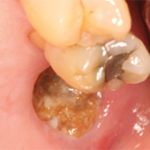Common expected side effects of Mvasi include nose bleeds (epistaxis), headache, high blood pressure (hypertension), inflammation of the nasal cavity (rhinitis), high levels of protein in the urine (proteinuria), taste alteration, dry skin, rectal bleeding (hemorrhage), excessive tear production (lacrimation disorder), back pain and skin irritation (exfoliative dermatitis).
Serious expected side effects of Mvasi include holes in or abnormal connection between two organs (perforation or fistula), blood clot formation (arterial and venous thromboembolic events), hypertension, problems in brain function or structure (posterior reversible encephalopathy syndrome), high levels of protein in the urine (proteinuria), infusion-related reactions and loss of function of the ovaries (ovarian failure). Patients should stop using Mvasi if these side effects become severe or life-threatening. Women who are pregnant should not take Mvasi because it may cause harm to a developing fetus.
Like Avastin, the labeling for Mvasi contains a Boxed Warning to alert health care professionals and patients about an increased risk of holes in the stomach and intestines (gastrointestinal perforations); surgery and wound healing complications; and severe or fatal pulmonary, gastrointestinal, central nervous system and vaginal bleeding (hemorrhage). Patients should stop using Mvasi if gastrointestinal perforation occurs. Patients should not take Mvasi in the 28 days prior to and after elective surgery, and until the surgical wound is fully healed. Patients should stop using Mvasi if a surgical incision breaks open (wound dehiscence). Mvasi should not be given to patients with severe hemorrhage or in patients who cough up blood (hemoptysis).
The FDA granted approval of Mvasi to Amgen, Inc. Avastin was approved in February 2004 and is manufactured by Genentech, Inc.
The FDA, an agency within the U.S. Department of Health and Human Services, protects the public health by assuring the safety, effectiveness, and security of human and veterinary drugs, vaccines and other biological products for human use, and medical devices. The agency also is responsible for the safety and security of our nation’s food supply, cosmetics, dietary supplements, products that give off electronic radiation, and for regulating tobacco products.



